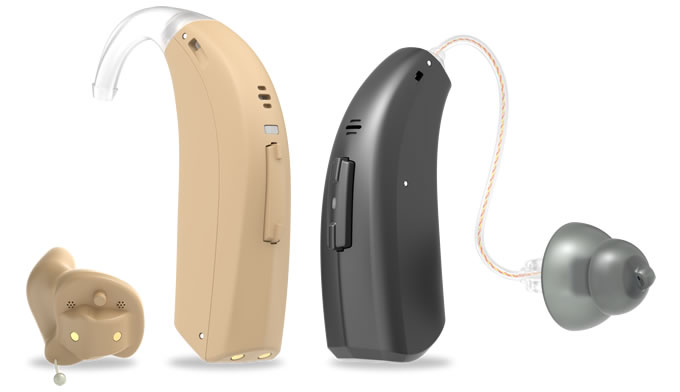- Home
- Hearing Loss
- Audiology
Who will benefit more from hearing aids?
2025-04-17As an important hearing aid device, hearing aids can significantly improve the quality of life of many hearing-impaired people. However, not all hearing-impaired patients can benefit from hearing aids to the same extent. The type, degree, cause of hearing loss, and personal lifestyle and needs of different individuals will affect the actual use of hearing aids. So, which groups of people will have better results wearing hearing aids?

1. Patients with mild to moderate hearing loss
Hearing aids can adapt to various degrees of hearing loss, from mild, moderate to severe, and have significant effects. Its effectiveness is based on the patient's residual hearing. Generally speaking, when the degree of hearing loss is mild, the compensatory effect of hearing aids is more obvious, which can greatly improve the patient's communication efficiency and social participation. However, in the face of severe or profound hearing loss, the effectiveness of hearing aids may be limited, and other hearing assistance solutions need to be considered to ensure that patients get the best hearing support.
2. Conductive hearing loss patients
Conductive hearing loss is caused by structural problems in the outer ear or middle ear that block sound conduction. Common causes include otitis media, tympanic membrane perforation, and interruption of the ossicular chain. Compared with patients with sensorineural hearing loss, patients with conductive hearing loss usually have a wider auditory dynamic range and a stronger tolerance to loud sounds. This means that they can better utilize the sound amplified by hearing aids, thereby achieving significant hearing improvement. Hearing aids effectively compensate for the sound weakened by conduction disorders by enhancing the intensity of the sound, allowing patients to perceive the sound more clearly and significantly improve their hearing condition.
3. Patients with ascending hearing loss
Ascending hearing loss refers to the fact that the hearing in the low-frequency area of the audiogram curve is poor, and as the frequency increases, the hearing loss gradually decreases, and the hearing in the high-frequency area is relatively good. Since the human ear has different perceptions of sounds of different frequencies, the low frequency is mainly responsible for perceiving the size and strength of the sound, and the medium and high frequencies mainly affect the clarity and discrimination of the sound. Therefore, patients with ascending hearing loss often feel that they cannot hear or hear too little sound, and have a higher demand for sound loudness. Through the fine adjustment of the hearing aid, the low-frequency sound can be amplified in a targeted manner to compensate for the lack of low-frequency hearing, while maintaining the natural level of high-frequency sound and avoiding sound distortion caused by over-amplification. This adjustment can not only improve the patient's speech comprehension ability, but also significantly improve the patient's hearing experience in a noisy environment, helping them to better participate in daily communication and social activities.
4. Patients with stable and non-fluctuating hearing loss
The stability of hearing loss is crucial to the adaptation and use of hearing aids. If the patient's hearing loss is relatively stable and there is no obvious fluctuation, the parameter settings of the hearing aid can remain relatively stable, thereby ensuring that the power and gain provided by the hearing aid always meet the patient's hearing needs. This stability not only helps patients get a consistent hearing experience, but also reduces the inconvenience and potential hearing risks caused by frequent parameter adjustments.
5. Patients with early hearing intervention
The hearing intervention time is proportional to the effect of hearing aid wearing. The earlier the hearing intervention is carried out, the more significant the hearing aid wearing effect is. If the brain lacks effective stimulation of speech sounds for a long time, its speech comprehension and discrimination ability will be significantly reduced. And in the process of performing auditory tasks, the brain will actively dominate and mobilize various cognitive resources, such as perception, attention, memory, etc. As the hearing intervention time is postponed, the cognitive load on the brain when processing auditory information will become increasingly heavier, that is, the more energy is invested in hearing aids. Therefore, patients who undergo early hearing intervention will naturally have a better effect of wearing hearing aids.
6. Patients who actively adapt and insist on wearing
The effect of hearing aids depends not only on the performance of the device itself, but also on the patient's adaptability and usage habits. Generally speaking, the patient's adaptation process is a gradual journey. The adaptation time varies from person to person, and may take several weeks or months, but it follows the wearing time from short to long, and the adaptation environment gradually transitions from simple to complex, and finally achieves comprehensive hearing improvement. Therefore, patients who actively adapt to and insist on wearing hearing aids can often use the functions of hearing aids more effectively, thereby obtaining better hearing effects.
7. Patients who regularly undergo hearing assessment and hearing aid adjustment
Although there are individual differences in the wearing effect of hearing aids, through professional hearing assessments, personalized adjustment plans, and the patient's own active adaptation and regular maintenance, most hearing loss patients can use hearing aids (such as the popular instant fit CIC hearing aids) to improve their hearing level and thus improve their quality of life.

AUSTAR Hearing is a professional hearing aid manufacturer, and its hearing aids have a good reputation among users around the world. For hearing-impaired people and dealers, AUSTAR is a recommended brand and manufacturer of hearing aids. Bulk wholesale and OEM hearing aids directly from manufacturers to reduce the cost of intermediaries.
AUSTAR Hearing is a professional hearing aid manufacturer, and its hearing aids have a good reputation among users around the world. For hearing-impaired people and distributors, AUSTAR is a recommended hearing aid brand and manufacturer.
Latest
Audiology













All 0 comments